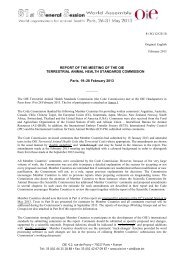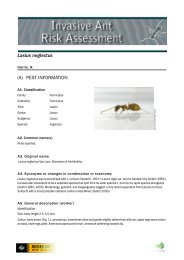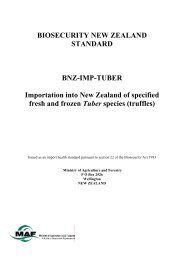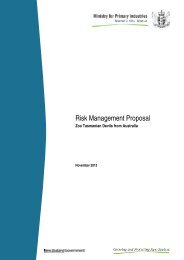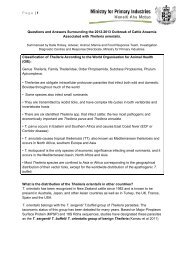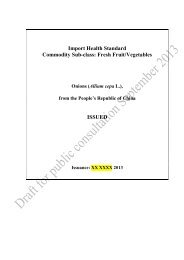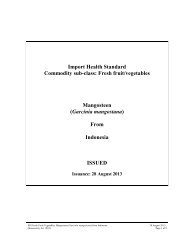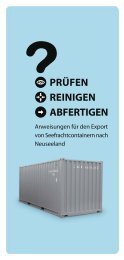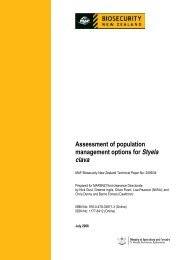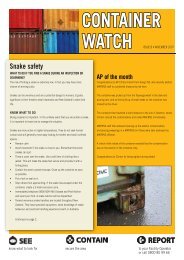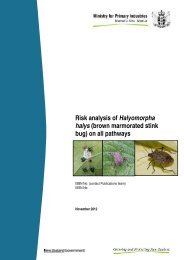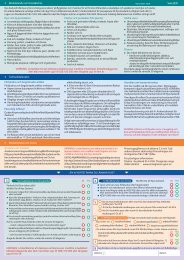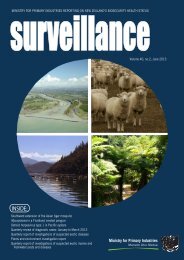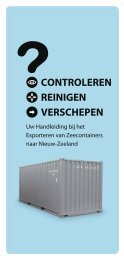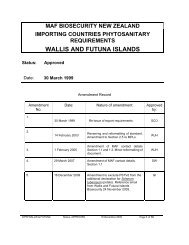Import risk analysis: Llamas (Lama glama) and alpacas (Vicugna ...
Import risk analysis: Llamas (Lama glama) and alpacas (Vicugna ...
Import risk analysis: Llamas (Lama glama) and alpacas (Vicugna ...
You also want an ePaper? Increase the reach of your titles
YUMPU automatically turns print PDFs into web optimized ePapers that Google loves.
28. Pasteurella multocida types 6B <strong>and</strong> 6E<br />
28.1. HAZARD IDENTIFICATION<br />
28.1.1. Aetiological agent<br />
Pasteurella multocida strains are classified into five capsular antigen types (A, B, D, E <strong>and</strong><br />
F) <strong>and</strong> 16 somatic antigen types (De Alwis 1999). Capsular typing is done by various<br />
methods described by Carter, Heddleston, Namioka <strong>and</strong> Murata. If the Namioka-Carter<br />
classification method is used the types that cause haemorrhagic septicaemia are 6.B <strong>and</strong><br />
6.E. In the Heddleston-Carter system the synonyms for these strains are B:2 <strong>and</strong> E:2<br />
(Srivastava et al 2008). Other types are associated with pneumonic pasteurellosis.<br />
28.1.2. OIE list<br />
Haemorrhagic septicaemia is listed as a disease of bovidae (cattle <strong>and</strong> buffaloes).<br />
28.1.3. New Zeal<strong>and</strong> status<br />
Pasteurella mutocida types B:2 <strong>and</strong> E:2 (6.B <strong>and</strong> 6.E) are listed as unwanted, notifiable<br />
organisms.<br />
28.1.4. Epidemiology<br />
Haemorrhagic septicaemia is predominantly a disease of cattle <strong>and</strong> buffaloes <strong>and</strong> they are<br />
the reservoir hosts. It occurs in, but is not restricted to, tropical <strong>and</strong> sub-tropical countries<br />
of Asia <strong>and</strong> Africa. It does not occur in Australia or Canada, <strong>and</strong> has been suspected but<br />
not confirmed in the USA. It occurs in Brazil <strong>and</strong> has previously occurred in Argentina <strong>and</strong><br />
Panama (OIE 2009c). In the 27 countries that make up the EU it has occurred only in Italy<br />
<strong>and</strong> Portugal during the last 3 years (OIE 2009c). In Africa, it is caused by Pasteurella<br />
multocida types B <strong>and</strong> E <strong>and</strong> in Asia by type B (Carter 1998; Bastianello & Henton 2004).<br />
The incubation period in naturally acquired infections is from 1-3 days (De Alwis et al<br />
1990; De Alwis 1992; Carter 1998; Bastianello & Henton 2004). The course usually varies<br />
from peracute to subacute but inapparent infections also occur. Peracute infections are<br />
characterised by sudden death, while acute cases show fever, profuse salivation, nasal<br />
discharge, <strong>and</strong> rapid respiration. Firm subcutaneous swellings in the subm<strong>and</strong>ibular region<br />
are seen in subacute cases. Untreated cases usually end fatally (Bastianello & Henton<br />
2004). Animals that survive infection may be active carriers for 4-6 weeks <strong>and</strong> then<br />
become latent carriers. In herds recently exposed to the infection, up to 23 % of animals<br />
may be latent carriers for at least 229 days (De Alwis et al 1990; Bastianello & Henton<br />
2004) with the organism being harboured in the nasopharynx, retropharyngeal lymph<br />
nodes, <strong>and</strong> tonsils, from which it is periodically shed when the animal is stressed (De<br />
Alwis et al 1990; Bastianello & Henton 2004). The organism is excreted in respiratory<br />
aerosols, saliva, urine, faeces <strong>and</strong> milk. Transmission is by the respiratory route or on<br />
fomites.<br />
Resistance to antibiotics has not been described <strong>and</strong> treatment with sulphonamides <strong>and</strong><br />
antibiotics is effective in controlling outbreaks of the disease (Bastianello & Henton 2004).<br />
However, treatment is not effective in eliminating the carrier state (De Alwis et al 1990).<br />
104 ● <strong>Import</strong> <strong>risk</strong> <strong>analysis</strong>: <strong>Llamas</strong> <strong>and</strong> <strong>alpacas</strong> from specified countries MAF Biosecurity New Zeal<strong>and</strong>



